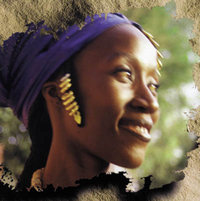 |
Both delicate and intense, filled with nostalgia or strong hope, Rokia Traoré's voice journeys through the world of an artist who created her own style in a country among the musically richest in all Africa. During her childhood, she fed on the seemingly trance-like rhythms of Upper Niger, the sharp beat of the chants of the stars of the National Ensemble, the syncopated style of Lamisse Bengali - the renowned balafola (1) from Kénédougou - the bittersweet voices of the singers from Wassoulou... to learn their vocal and instrumental techniques.
In 1998, she realized Mouneïssa. This first album gave rise to astonishment and revealed to music-lovers a vocalist of magical talent, open to both ancestral traditions and the diverse influences of the life of a wanderer. We find her peaceful atmospheres, touched with an almost surreal concern, so typical of Sahel songs.
Discography:
" Mouneïssa"
Indigo/Harmonia Mundi
" Wanita"
Indigo/Harmonia Mundi
This newly acquired recognition prompted her to evolve vocally and perfect her arrangements. "Tonalities that are foreign to my language call out to me, suggesting surprising melodies, the singer explains. Sometimes I pretend I'm a rocker singing in Bamanan! What's important to me is to choose the right modulation with respect to the intensity of the note while preserving its delicacy, which gives all the colour to my singing."
If the historical singers, such as Hawa Dramé, "Young" Fanta Demba or the "première" Amï Koïta remain her references, Rokia innovated many new ways of singing that brought to her style a personal stamp. To the flights of the djelimoussos (2) with their striking high notes, dizzying descents and Arabic intonations, she prefers a more intimate phrasing, finely bordered with barely hushed murmurs, lit up by the effects that confer light and depth to her voice.
Herein lies the challenge of Rokia Traoré: make an authentic, innovate music, without giving in to trends. She surrounds herself with a team trained in time-honoured school of tradition. Her musicians essentially use local instruments (balaba, n'goni, karignan, gaïta, djembé...), but her voice remains free to depart from established aesthetic canons.
In this second album, she returns to the acoustic orchestration of Mouneïssa (joined by an electric bass on four pieces) and pursues the experience of the preceding recording, uniting the groaning timbre of the great balafonist Balaba - so well known for hosting moonlit dances - with the more subtle, though deeper, riffs of then'goni bâ, the tetrachord guitar that punctuates epic tales. Listening to it, we discover a highly varied rhythmic and melodic canvas.
Sometimes melancholic, sometimes shimmering, Rokia Traoré's voice reflects the unfathomable destiny of the human being, singing a poignant ode to the dignity of women ("Muso Niyalén"), trembling, whispering or pulsating like a little drum, reminding us of the foundations of the philosophy of the ancients ("Wanita").
The sounds that circulate in her mind are transformed through her vocal chords into melodic cells that express emotion, bearing aloft an image lost in space or time. Here is the secret of any singer: creating his or her own language - a musical idiom sprung from a sometimes mysterious source and that touches our very hearts.
|
|